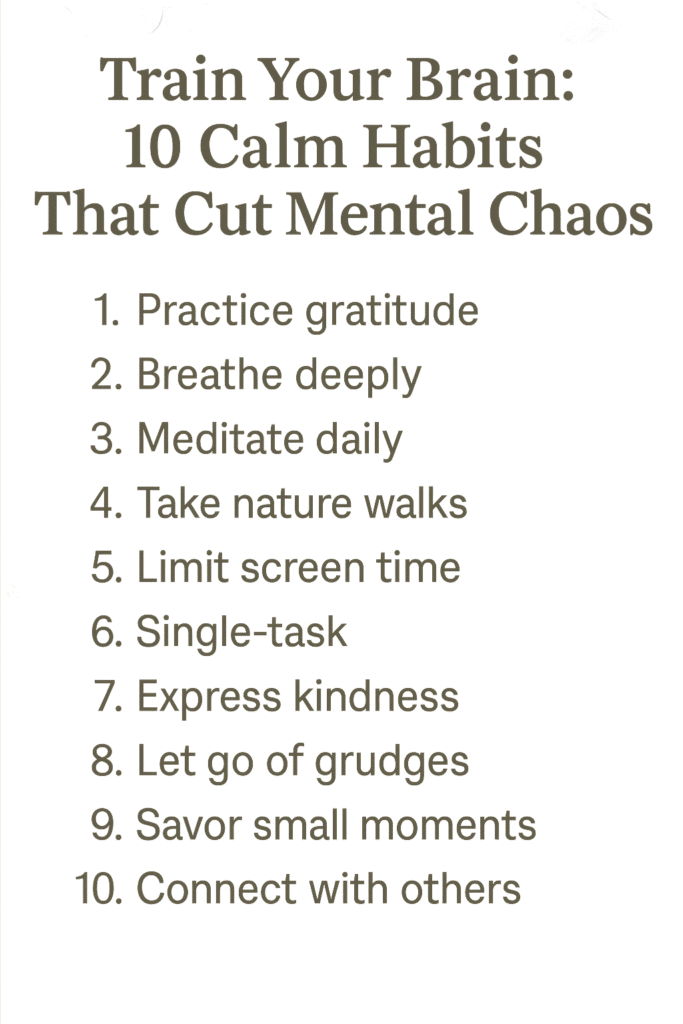Train your brain with 10 calm habits that reduce stress, boost focus, and bring lasting peace to your daily life.
🌱 “Every mindful breath is a step toward a peaceful world.”

What You’ll Gain from These 10 Habits
In a world constantly pulling at your attention—notifications, deadlines, and overstimulation—your brain craves peace like dry land thirsts for rain. These 10 calm habits are more than just short-term strategies; they are neurological transformations that gently yet powerfully reshape your mind.
Here’s what consistent practice will bring into your life:

🧠 1. Reduced Mental Clutter
Every small calming habit, from journaling to daily silence, trains your brain to pause, observe, and let go of unnecessary mental loops. With fewer scattered thoughts, you’ll feel lighter and more present.
🔄 2. Rewired Thought Patterns
Thanks to neuroplasticity, your brain is always adapting. The more you repeat healthy, grounding habits, the more you forge new, calm-first neural pathways, replacing reactive or anxious responses with peace and intention.
🔥 3. Better Emotional Control
With a calmer baseline, your emotional responses become less explosive and more reflective. These habits help regulate cortisol and trigger feel-good chemicals like dopamine, serotonin, and oxytocin—making emotional balance feel natural.
🎯 4. Sharper Focus and Productivity
When your brain isn’t in fight-or-flight mode, it can think more clearly. These habits unlock deep focus, spark creativity, and eliminate the overwhelm that often leads to procrastination.
5. Better Relationships
A calm mind listens better, speaks with more empathy, and sets healthier boundaries. Your inner peace will radiate outward, improving your connection with family, friends, and even strangers.
🌙 6. Deep Rest and Better Sleep
By signaling safety and rest to the nervous system throughout the day, you prepare your body and brain to truly let go at night. The result: deeper, more restorative sleep.
Train Your Brain Habit #1—Start Your Day Without Screens
The Cortisol Spike and Digital Overload
The moment your eyes meet a screen in the morning—be it your phone, tablet, or even a smartwatch—your brain gets jolted with a flood of information. This kicks off a surge in cortisol, the body’s primary stress hormone, which is naturally high upon waking. But instead of tapering off gently, screen stimulation keeps it elevated. That morning, scroll through the news, emails, or social media. It wires you for distraction before your day even begins.
More troubling? Studies show that early screen exposure affects focus, mood, and memory retention, leaving you mentally fragmented and emotionally reactive.
Morning Rituals That Ground You
Replacing screens with mindful practices doesn’t mean giving up productivity—it means reclaiming your mind’s natural rhythm. Rituals anchor the nervous system and prime your brain for a balanced, intentional day.
Here are a few screen-free ways to greet your morning with peace:
- Light Stretching or Gentle Yoga: Awakens the body and releases overnight tension.
- Gratitude Journaling: Trains your brain to focus on abundance.
- Drinking Warm Water with Lemon: Aids digestion and signals the body it’s time to wake up.
- Stepping Outside: Natural light helps regulate circadian rhythm and boosts dopamine.
- Listening to calming music or natural
- Sounds activate the parasympathetic nervous system (your “rest and digest” mode).
Try This: 30-Minute Screen-Free Sunrise Routine
0–10 mins: Hydrate mindfully with warm water or herbal tea. Sit quietly by a window or step out into fresh air. Just breathe and notice the morning.
10–20 mins: Gentle movement—like cat-cow stretches, neck rolls, or a few rounds of Surya Namaskar—to awaken the body.
20–30 mins: Write down 3 things you’re grateful for. Set an intention for the day—not goals, but how you want to feel (e.g., calm, focused, present).
By the end of these 30 minutes, you’ll feel centered, energized, and internally spacious—ready to face the world, not race it.
Train Your Brain 2—it’s #2—Breathe Before You React
The Power of the Pause
In a split second, your brain can leap from peace to panic. A sharp email, a traffic jam, a critical remark—your fight-or-flight instinct flares. But here’s the truth most of us forget: between stimulus and response, there is space. And in that space lies your power.
Even a brief pause allows your prefrontal cortex, the wise and decision-making part of your brain, to speak before your primal brain takes over. It creates a sacred micro-moment to respond, not react.
Learning to breathe before reacting isn’t weakness—it’s mastery. It’s the key to handling life with grace.
3-Breath Technique to Reset Your Nervous System
You don’t need 20 minutes of meditation to find calm. You just need three deep breaths—done with attention and intention. Here’s how:
- Inhale slowly through your nose (4 seconds). Feel your belly expand. Breathe in calm.
- Hold for a moment (2 seconds). Let your body settle into the stillness.
- Exhale through your mouth (6 seconds). Imagine releasing tension, like fog lifting off a lake.
- Repeat it two more times. Let each breath feel slower, deeper, and more grounded.
✨ Optional upgrade: Add a phrase like “I’m safe” or “This too shall pass” on the exhale. It helps anchor the mind as well as the body.
This quick breath ritual signals your parasympathetic nervous system to calm the heart rate, lower cortisol, and gently bring you back to presence.
Real-Life Example: Defusing Conflict with Calm
Imagine this: You’re in the middle of a family discussion that’s turning tense. Accusations fly, voices rise—and just as your instinct screams to defend yourself, you pause.
You breathe.
Not once, but deliberately, three times. Inhale. Exhale.
By the third breath, your voice softens. You respond—not with sharp words, but with steadiness. You ask a clarifying question. You meet emotion with empathy.
And slowly… the heat dissolves.
This isn’t fantasy. It’s the real ripple effect of a single breath: your calm becomes contagious.
Train Your Brain Habit #3 – Declutter One Small Space Daily
Visual Noise = Mental Noise
Clutter isn’t just physical—it’s psychological. A messy desk, overflowing drawer, or chaotic inbox sends constant signals to your brain that something’s unfinished. This low-grade stress builds up, draining your focus and emotional energy.
The 5-Minute Drawer Detox
Pick one drawer, shelf, or corner. Set a timer for 5 minutes. Toss what you don’t need, wipe it clean, and neatly arrange what remains. That tiny win creates a ripple effect of calm and control.
Bonus: How to Make It a Mindful Ritual
As you declutter, breathe deeply. Say silently, “I release what no longer serves me.” Let this be a moment of presence—not just productivity.
💧 Train Your Brain Habit #4 – Hydrate Before You Caffeinate
Brain Fog and Dehydration
After 6–8 hours of sleep, your body wakes up dehydrated. Reaching for coffee first thing only worsens it, spiking cortisol and draining your system. Water, on the other hand, reboots your brain and metabolism.
Morning Hydration Hacks
- Keep a glass of water by your bed
- Add a pinch of sea salt for electrolytes
- Drink before brushing to flush toxins
Ayurvedic Twist: Warm Lemon Water Ritual
Start your day with warm water, lemon, and a slice of ginger. It awakens digestion, hydrates deeply, and sets a mindful tone.
🌿 Train Your Brain Habit #5 – Step Outside for 10 Minutes
Nature’s Neurological Reset
Just 10 minutes in natural light reduces cortisol, boosts serotonin, and resets your circadian rhythm. It’s like a soft reboot for your nervous system.
The “Green Microbreak” Method
Take a short walk, sit under a tree, or simply gaze at the sky. Even urban greenery has measurable calming effects.
Grounding Practices for Urban Dwellers
- Walk barefoot on grass
- Touch a tree with intention
- Breathe deeply while observing clouds or birds
✍️ Train Your Brain Habit #6 – Journal 3 Things You’re Grateful For
Gratitude and Brain Chemistry
Gratitude activates the brain’s reward system, releasing dopamine and serotonin. It rewires your mind to notice abundance over lack.
How to Make It Stick (Even If You Hate Journaling)
Keep it simple. Use a sticky note, voice memo, or gratitude jar. The key is consistency, not perfection.
Gratitude Prompts for Emotional Clarity
- What made me smile today?
- Who supported me recently?
- What challenge taught me something?
🛑 Train Your Brain Habit #7 – Say No Without Guilt
Boundaries as Brain Protectors
Every “yes” to something misaligned is a “no” to your peace. Boundaries aren’t selfish—they’re sacred.
Scripts for Saying No with Grace
- “I’m honored you asked, but I can’t commit right now.”
- “That doesn’t align with my priorities at the moment.”
- “Let me check my bandwidth and get back to you.”
The “Energy Audit” Technique
List your weekly commitments. Highlight what drains vs. energizes you. Adjust accordingly.
📵 Train Your Brain Habit #8 – Limit News and Social Media
The Dopamine Trap of Doomscrolling
Endless scrolling hijacks your brain’s reward system, leaving you anxious, distracted, and emotionally numb.
Digital Diet: How to Cut Back Without FOMO
- Set app timers
- Use grayscale mode
- Replace scrolling with a calming ritual (like tea or journaling)
Apps and Tools to Help You Unplug
- Forest: Stay focused by growing a virtual tree
- Freedom: Block distracting sites
- One Sec: Adds a pause before opening addictive apps
🔇 Train Your Brain Habit #9 – Practice 2 Minutes of Silence
Silence as a Superpower
In a noisy world, silence is radical. Just 2 minutes of stillness can lower blood pressure, reduce anxiety, and sharpen focus.
Micro-Meditation for Busy Minds
Sit. Close your eyes. Breathe. Let thoughts come and go like clouds. No pressure. Just presence.
Pairing Silence with Breath or Mantra
Try repeating a calming phrase like “I am here” or “Let it be” with each breath. This anchors your awareness gently.
🌙 Train Your Brain Habit #10 – End Your Day with a Calming Ritual
The Sleep-Calm Connection
Your brain needs a wind-down cue to shift from alertness to rest. Without it, sleep becomes shallow and restless.
Create Your Own “Digital Sunset”
Turn off screens 60 minutes before bed. Dim the lights. Let your body know it’s time to slow down.
Ritual Ideas: Candlelight, Stretching, Herbal Tea
- Light a candle and reflect on the day
- Do 5 minutes of gentle stretching
- Sip chamomile or tulsi tea while journaling or reading
🌟 Conclusion—Rewire Your Mind, Reclaim Your Peace
How Small Habits Lead to Big Transformation
Each of these habits is a gentle nudge toward a calmer, more intentional life. They don’t demand perfection—just presence. Over time, they rewire your brain to seek peace over pressure.
Your 10-Day Brain-Calming Challenge
Try one habit each day. Reflect on how it feels. Notice what shifts. Then repeat the ones that resonate most.
Final Thoughts: Peace Is a Practice
You don’t have to escape your life to find peace. You just need to meet it—moment by moment, breath by breath. Your brain is listening. Train it with love.
Gayathri Jayanthi: The 5 Epic Blessings of Gayatri Mantra
Share this content:

